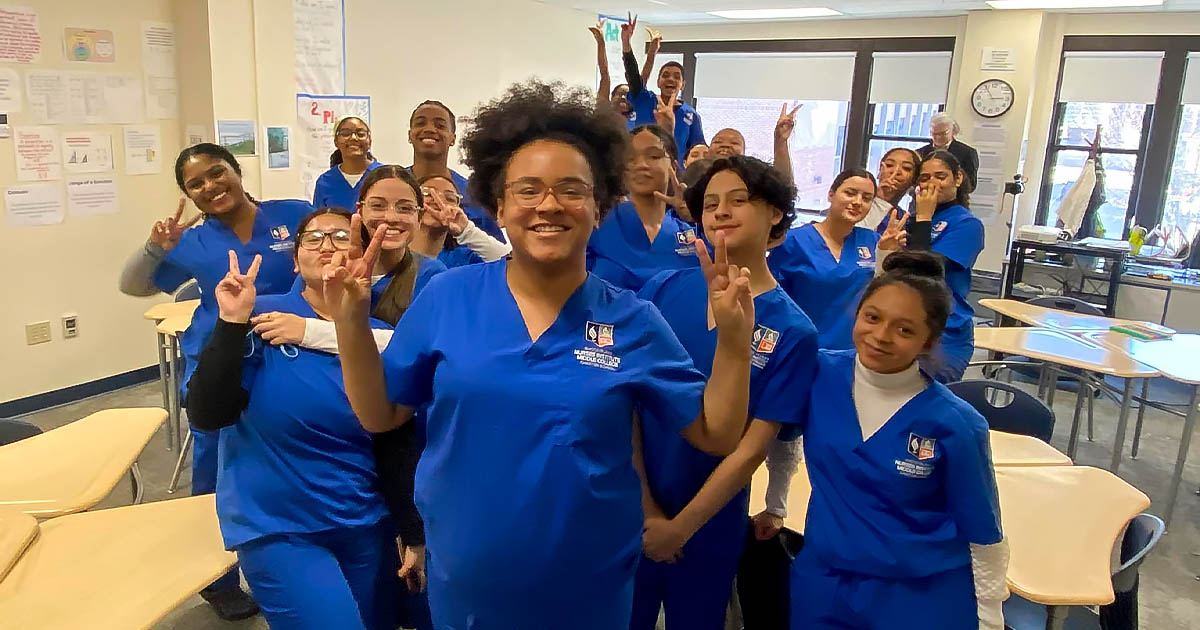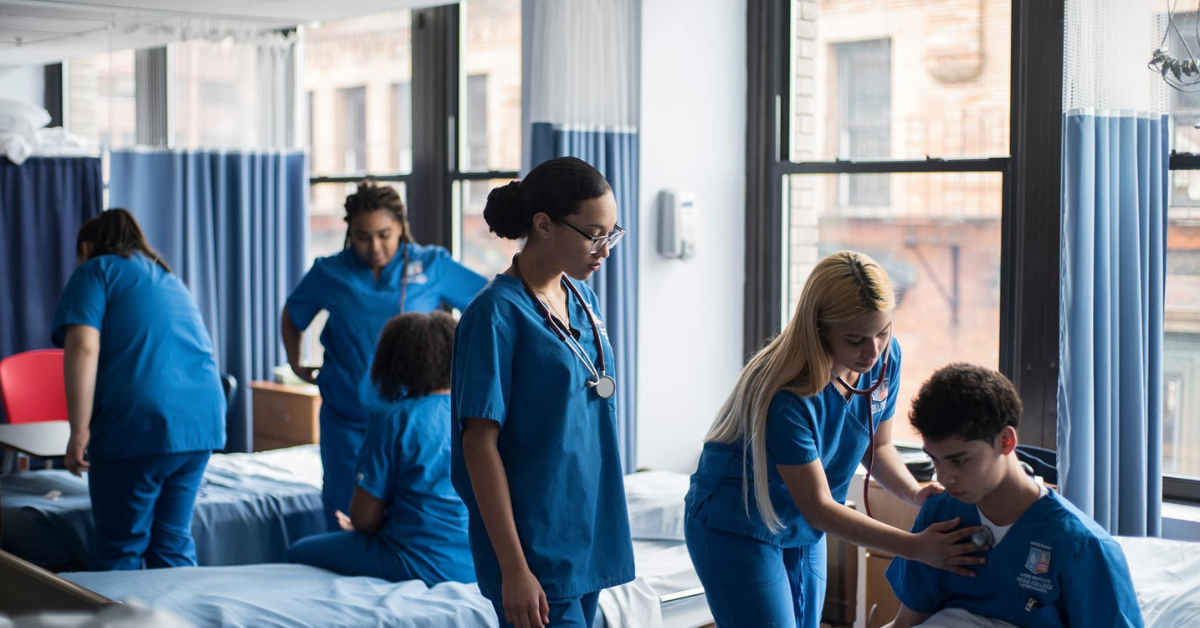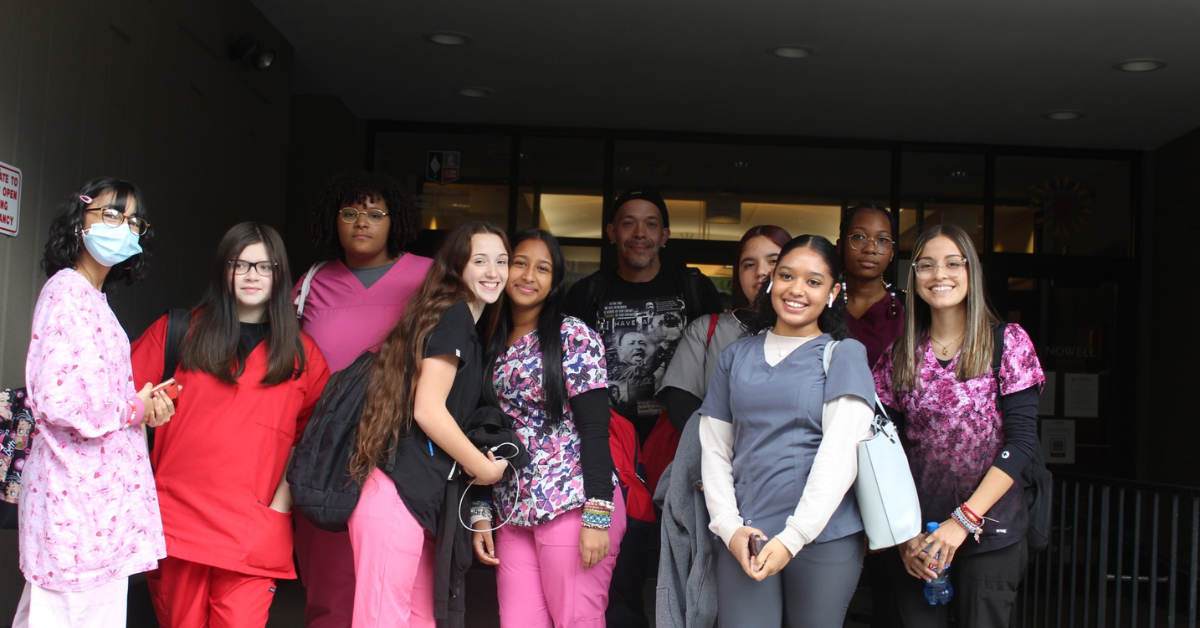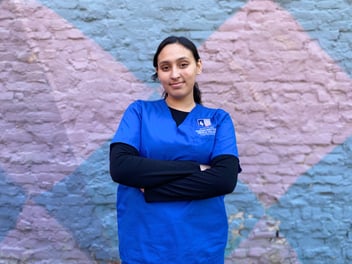
Jasmine Alvardo, 18, is a senior at The Rhode Island Nurses Institute Middle College Charter High School (RINI), a community charter school located in downtown Providence.
The school sits only a mile or so from the Hasbro Children’s Hospital, where Alvardo first began considering a career in medicine, years ago.
When she graduates later this spring, she’ll have a head start in nursing and a solid foundation for any medical career–including her childhood dream of becoming a pediatric oncologist.
RINI is a one-of-a-kind school. Started by nurses in 2011, the school’s guiding principle is to train more nurses who mirror the population of their local communities. Any student across the state can enter a blind lottery for admission. There are currently 399 students. By the 2024-2025 school year, there will be 500 students.
Many of these future nurses speak languages other than English.
Having nurses of different ethnic backgrounds makes a difference in patient outcomes, said Pamela McCue, RINI’s CEO. With both an RN and a PhD under her belt, plus 30 years of nursing experience in the field, she has the experience to know.
“The nursing workforce is not diverse,” McCue said. “We’re about 81 percent middle-aged white females.” Meanwhile, the U.S. population is becoming increasingly diverse. With a student body that is predominantly Black, Brown, and multilingual, RINI’s students are the nurses of the future.
Challenging Academics Give Students a Jump on College
Alvardo was just six years old when she got her first exposure to nursing. A childhood brain tumor meant she spent a lot of time in hospitals.
“I had the best connections with my nurses and, honestly, had a better time than I thought I was going to have because when you’re in that situation, like, you don’t expect to have fun,” she said.
Alvardo has bright eyes, long dark hair, and a preternaturally mature personality. She’s grateful to have an opportunity to pursue nursing at such a young age.
“It’s not an easy school but you learn a lot,” she said.
The challenge is part of the point, McCue noted. “We looked down the pathway, and we looked into college programs, and then we thought the biggest barrier to workforce diversity is educational inequities.”
McCue and her nursing colleagues designed RINI’s program to accelerate young people educationally and ensure their academic preparation would meet industry demands. “We looked at the workforce and then we said, “Okay, what do we need to do?” she said.
RINI students leave high school with as many as 18 college credits, including college nursing prerequisites like anatomy, biology, and other sciences.

Practical Skills Build Community Workforce
Beyond academic coursework, students also must complete clinical rotations and an internship involving direct patient care to graduate. Along the way, they earn their certified nursing assistant license. For freshly-minted high school graduates, these advantages can make all the difference when it comes to successfully launching a career.
Jenny Santana, director of nursing, stays close to the students every step of the way. If someone needs help, Santana jumps in. She will draft a plan alongside a student, and sometimes the parent. Goals are set. There’s a framework in place to help the student learn or hone a skill needed on the job.
She also watches students carefully to make sure they are ready to start patient care. Characteristics she’s looking for in students before they start working directly with patients are confidence, time management, maturity, and empathy. Can the student receive constructive feedback? Will they show up on time and ready to work?
Employers say yes. “The students coming from RINI are professional. They’re very good to work with. They’re fun; they’re eager,” said Amy Lemieux, an HR specialist at Tockwotton on the Waterfront, a senior living community in Providence. “The RINI school does a very good job with instilling that professionalism.”
Local community leaders are taking note. “The work-based learning experiences are helping diversify the educational ecosystem here in Rhode Island and prove to students that preparing for the future does not have to be costly,” said John Goncalves, a Providence City Council representative who oversees Ward 1, where RINI is located.
Too many students are starting their healthcare careers saddled with student debt, and this school is changing that trajectory, Goncalves said. These students will have their nursing core classes finished by the time they are ready to start their undergraduate degrees.
“We are easing the financial burden for low-income, and minority students who face a unique set of challenges,” he said. “I am hopeful that we are setting a precedent for creative alternatives that save money and prepare high school students for the working world.”-John Goncalves

RINI Students Achieve Their Dreams
At RINI, students’ motivations to enter nursing often have deeply personal roots. Junior Samantha Tamayo, 17, wanted to study nursing because of her mother. Tamayo’s mom was in Colombia studying nursing but, due to inherent danger and conflict in her home country, immigrated to the United States.
 “She moved here and she couldn't continue her career because it’s different, and it’s in a different language,” Tamayo explained. Her mother obtained her CNA license and later her medical assistant certification, something that was an early influence on Tamayo.
“She moved here and she couldn't continue her career because it’s different, and it’s in a different language,” Tamayo explained. Her mother obtained her CNA license and later her medical assistant certification, something that was an early influence on Tamayo.
As a child, Tamayo would walk to her mother’s job after school. “I would go there and see, like, how she interacted with her patients and with the coworkers, the environment, everything she had to do. I thought it was really fun and cool.”
Like Alvardo, Tamayo has a sense of direction that might be unusual for kids her age. She knows what she wants to do and how to get there.
“I want to go into the operating room or plastic surgery,” she said. “I really like how intricate surgery is. You have to know what you’re doing and really pay attention to the body systems.”
Tamayo completed her clinicals at an assisted living facility, where she assisted patients with dementia.
“It’s hard to see people go through something like that, but I think the experience made me a better person,” she said.
Tamayo is making her mother proud by taking on a lot of responsibility during her teenage years, and setting up her future in a positive way.
“She feels like it’s a really great opportunity to just be with others and really, like, feel for others,” Tamayo said. “You can do everything, there are so many opportunities.”
Soon, young people in Albany, New York, will also be able to access this kind of high-quality nursing education. Next fall, Nurses Middle College-Capital Region will open its doors to its first ninth-grade class, creating opportunities for aspiring nurses in the Albany metropolitan area.
Editor’s note: for more on community charter schools with a special focus on careers, see our profiles on community charters in Indianapolis for traditional high school students and for adults.
Photos courtesy of Rhode Island Nurses Institute Middle College Charter High School.
Tracee Herbaugh is a writer and journalist based in the Boston area. Her work has appeared in publications including The Washington Post, Al Jazeera, Salon, The Associated Press, NPR and more.
The fight for educational equity has never been just about schools. The real North Star for this work is providing opportunities for each child to thrive into adulthood. This means that our advocacy...
Your donation will support the work we do at brightbeam to shine a light on the voices who challenge decision makers to provide the learning opportunities all children need to thrive.
Ed Post is the flagship website platform of brightbeam, a 501(c3) network of education activists and influencers demanding a better education and a brighter future for every child.
© 2020–2024 brightbeam. All rights reserved.